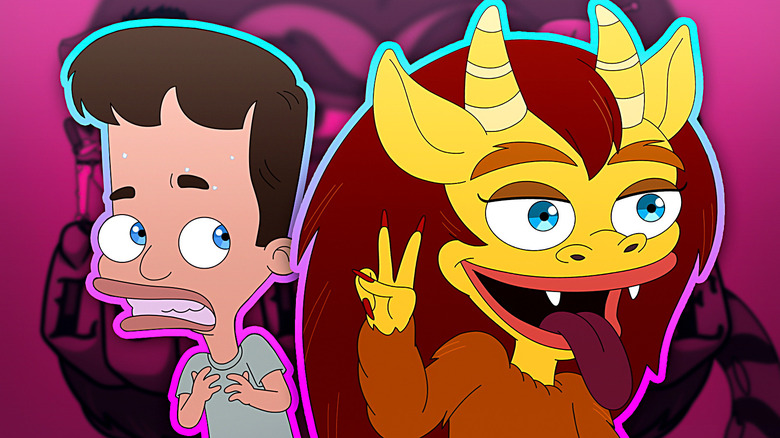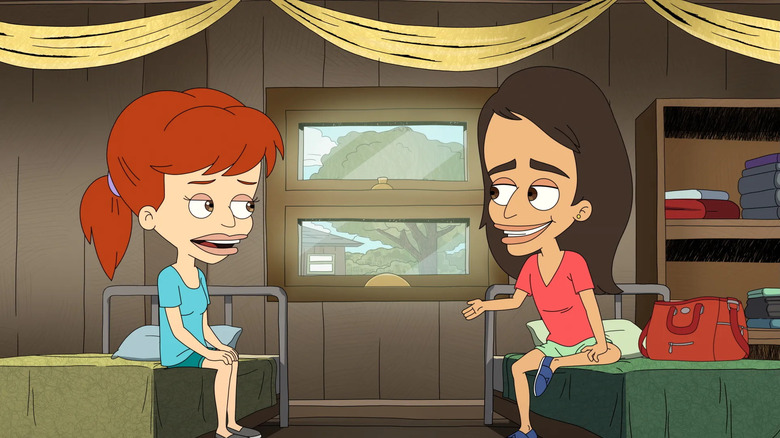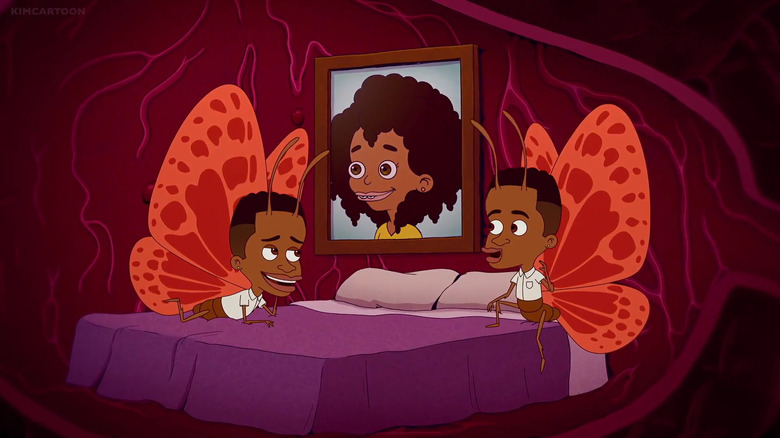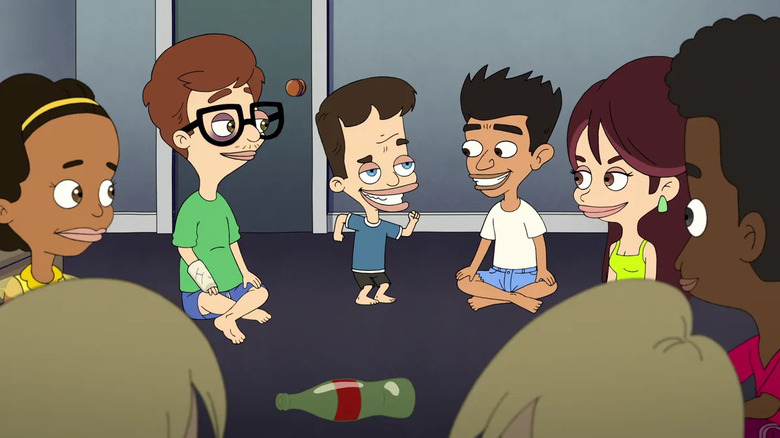After the completion of the upcoming eighth and final season, “Big Mouth” will surpass “Grace & Frankie” and tie with “Elite” to become the longest-running Netflix Original scripted series in the streamer’s history. The adult animated coming-of-age sitcom created by Andrew Goldberg, Nick Kroll, Mark Levin, and Jennifer Flackett was brought to life by the animation mavens at Titmouse, Inc., and tackles the peaks and problems of puberty through song, satire, and side-splitting humor. On the surface, “Big Mouth” might seem like the joke is nothing more than youngsters talking inappropriately about the birds and the bees, but there’s a deep honesty to the way the series explores themes of sex, sexuality, hormones, shame, irrational fears, relationships, and growing up — even if a literal Hormone Monster is used to personify those big feelings.
Nearly seven years after the show first debuted, “Big Mouth” has covered a wide variety of puberty-related topics, ones that are often too awkward or too uncomfortable to discuss with family, teachers, or even friends. Sure, we can ask a trusted adult where babies come from, but who do teens have to turn to when they read a book that makes them feel strange and tingly for the first time? Fortunately, whether “Big Mouth” ever set out to do it or not, the show is there for them.
I was recently invited to visit Titmouse, Inc. studios where I was given an exclusive preview of season 8, but also was able to have a casual chat with Goldberg and writer Mark Levin. At one point I mentioned that my 11-year-old niece was a huge fan of the show and loved how it provided her with talking points to ask her parents (and her auntie, me) about her own changing body. I was curious if the writers were conscious of impressionable youngsters who may be watching when creating their episodes.
As it turns out, the “Big Mouth” team is very aware that they might be filling the void of sex education, and are trying to do right by those who need the information most.
The real joke is sex education in America
As of publication, there is no federal standard in America for sex education. Legislative requirements differ wildly from state to state, and even in places that do require some form of sex education, what information is deemed necessary can differ depending on school districts. According to a study published by the Guttmacher Institute, less than half of teenagers who had engaged in penis-in-vagina sex reported that they had received some form of formal sexual education before they had intercourse.
That’s unsurprising, considering that the United States Congress created multiple federal grant programs to provide funding to schools with abstinence-only education. As of 2020, only 38% of high schools and 14% of middle schools teach all 19 topics identified as “critical” for sex education as determined by the Centers for Disease Control and Prevention (per the Sexuality and Information Council of the United States). Sure, kids today have the internet in the palm of their hands and can theoretically look up anything that they want to learn, but you don’t know what you don’t know. Not to mention, attempting to research anything taboo often just brings search results filled with pornography. Something needs to bridge the gaps in a lack of comprehensive education and parents who are too discomfiting to have these conversations. “They should just play ‘Big Mouth’ during sex education classes in year 6, I learned more during season 2 than the teacher ever taught me,” said model Leomie Anderson in a viral post on X from 2018.
It’s not the responsibility of “Big Mouth” to pick up the slack, but the compassionate and hands-on approach to the subject matter has proved invaluable.
Big Mouth lets actual tweens and teens lead
The folks working on “Big Mouth” don’t just incorporate their own coming-of-age experiences into the stories. They also defer to actual tweens and teens to ensure the show can resonate with today’s young folks and better represent the ever-expanding identities. One of the biggest examples came in season 6 when the show introduced Elijah, voiced by Brian Tyree Henry. “Big Mouth” is a pretty hormonally-charged (see: horny) show, but Elijah is different: he’s asexual. The team behind the show spoke with Shafia Zaloom, one of the leading experts on sexual consent education in the United States, and some of the students she works with. The teens asked them why they didn’t have an asexual character yet, and “Big Mouth” knew they needed to fill the void.
They don’t always get it right. In one of the show’s most controversial episodes, season 3’s “Rankings,” a character explains that she’s pansexual because bisexuality is “so binary.” To give “Big Mouth” some credit, the idea that bisexuality = “man and woman” while pansexuality = “all genders” is how a lot of people understand the difference between the two identities — including some LGBTQIA+ community members. In actuality, it’s far more nuanced and why a person would identify as one label or the other can differ from person to person. There isn’t a universal definition because both identities exist on a spectrum, and the creators were quick to acknowledge their mistakes. As Goldberg stated in a post on X/Twitter (before he was smart enough to leave that cursed app):
“We missed the mark here with this definition of bisexuality vs. pansexuality, and my fellow creators and I sincerely apologize for making people feel misrepresented. Any time we try to define something as complex as human sexuality, it’s super challenging, and this time we could have done better. Thank you to the trans, pan, and bi communities for further opening our eyes to these important and complicated issues of representation. We are listening and we look forward to delving into all of this in future seasons.”
This is a testament to how much the show’s writers clearly care about getting it right, because they recognize how many people are looking to “Big Mouth” as an educational tool. The reality is that there are a lot of people, regardless of age, who don’t understand the complexities of gender and sexuality and learn about other identities from the media they consume. The creative team is learning just like the characters are, and the show is better for it.
Big Mouth is a perfect show to be Netflix’s longest-running scripted series
The longevity of “Big Mouth” is multifaceted, as the animation from Titmouse, Inc. is as top-notch as the music and writing. But if I had to point to one thing — it’s the inherent curiosity present in each episode. Puberty is something that happens to us all, but how it affects us and how we feel about going through it is the furthest thing from ubiquitous. There is no such thing as a universal experience, and “Big Mouth” is understanding enough to try and give all coming-of-age growing pains the spotlight at some point or another. The show may have started out as a way for Nick Kroll and Andrew Goldberg to tell some hilarious stories inspired by their own tween years, but it has since expanded to become one of the most vital shows in animation history.
The raw, poignant commentary on the difficult (and sometimes disgusting) realities of growing up doesn’t just provide the perfect avenue for comedy, but it provides characters for viewers to live through vicariously — learning something about themselves in the process. Authentic depiction isn’t easy because it’s messy and can shift dramatically from person to person, but the over-the-top absurdity and fantastical elements create a safe distance between viewer and story, obliterating any chance of the show feeling like a series of “Very Special Episodes.”
Like many of the adult animated shows that came before it, “Big Mouth” is a show with a lot of heart and life lessons hidden in the Trojan horse of raunchy comments and pregnant pillows. The genuine emotional insight is the blood pumping through this overstimulated (and often aroused) heart, is guaranteed to capture the attention of any audience. And unlike any other show of its ilk, “Big Mouth” is also helping make more empathetic viewers by providing a legitimate education by dispelling the myths and preconceptions about other people.











![Speak No Evil Helped James McAvoy Understand How Men Get Radicalized Online [Exclusive Interview] Speak No Evil Helped James McAvoy Understand How Men Get Radicalized Online [Exclusive Interview]](https://i3.wp.com/www.slashfilm.com/img/gallery/speak-no-evil-helped-james-mcavoy-understand-how-men-get-radicalized-online-exclusive-interview/l-intro-1724251147.jpg?w=1200&resize=1200,0&ssl=1)